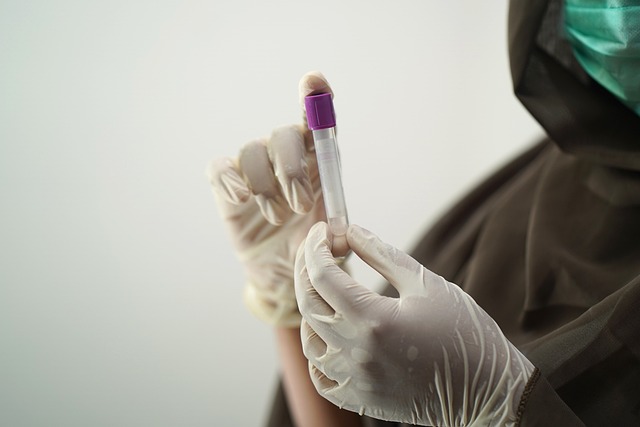The UK General Health Blood Test is a comprehensive analysis that plays a crucial role in assessing Vitamin D levels, which are vital for overall health and wellness. This nutrient not only supports bone health but also contributes to immune system function, cardiovascular health, and mental well-being. Regular monitoring of Vitamin D through this test helps identify deficiencies or imbalances early on, allowing healthcare providers to offer tailored advice and treatments. The test involves a simple blood sample collection, processed using advanced techniques like liquid chromatography-tandem mass spectrometry (LC-MS/MS), to accurately measure 25-hydroxyvitamin D [25(OH)D] levels—the standard for Vitamin D assessment. Healthcare professionals use these results to guide patients on dietary and lifestyle adjustments or supplementation, thereby preventing conditions associated with low Vitamin D levels. The UK General Health Blood Test is an indispensable resource for maintaining healthy Vitamin D levels, which is essential for safeguarding against the negative impacts of deficiency and promoting overall wellness. It serves as a critical diagnostic tool for those committed to optimal health through informed dietary and lifestyle choices.
Navigating the spectrum of health maintenance, understanding Vitamin D’s pivotal role in overall wellness is key. The UK General Health Blood Test emerges as a vital diagnostic tool, offering insights into your body’s Vitamin D status. This article delves into the significance of monitoring these levels through the lens of this comprehensive test, guides you through its procedure and interpretation, and provides actionable advice on optimising health with the insights gleaned. Embrace the power of the UK General Health Blood Test to enhance your well-being.
- Understanding the Importance of Vitamin D Levels and the UK General Health Blood Test
- The Procedure and Interpretation of the UK General Health Blood Test for Vitamin D Assessment
- Optimising Health with Vitamin D Insights from the UK General Health Blood Test: A Guide for Individuals and Healthcare Providers
Understanding the Importance of Vitamin D Levels and the UK General Health Blood Test

Vitamin D, often referred to as the ‘sunshine vitamin,’ plays a pivotal role in maintaining overall health and wellness. It is essential for strong bones, as it helps the body absorb calcium and phosphorus. Beyond its skeletal functions, Vitamin D has been linked to a myriad of health benefits, including immune system modulation, cardiovascular health, and even mental wellbeing. Understanding one’s Vitamin D levels is thus crucial for assessing overall health, particularly as deficiencies have been associated with a range of diseases.
The UK General Health Blood Test provides a comprehensive analysis that includes Vitamin D levels among other essential nutrient measurements. This test offers insight into an individual’s health status by detecting potential deficiencies or imbalances that may not be apparent through symptom assessment alone. By identifying Vitamin D insufficiency or deficiency, healthcare providers can tailor recommendations and treatments to address these issues proactively. For those looking to monitor their health holistically, the UK General Health Blood Test is an invaluable tool, offering peace of mind and a clear path towards maintaining optimal wellness. It’s a key diagnostic measure for individuals seeking to ensure their Vitamin D levels are within the healthy range, thus contributing to a robust defense against the adverse effects of deficiency.
The Procedure and Interpretation of the UK General Health Blood Test for Vitamin D Assessment

The UK General Health Blood Test is a comprehensive screening that includes an assessment of Vitamin D levels, which plays a critical role in maintaining bone health and supporting the immune system. When undergoing this test, individuals can expect to have a blood sample taken from a vein, typically in the arm or the finger for those with difficult-to-access veins. The process is relatively straightforward, involving cleaning the skin at the injection site, inserting a needle to extract blood, and then sending the collected sample to a laboratory for analysis.
Once the blood sample has been taken, it is transported to an accredited laboratory where the Vitamin D level is measured using reliable techniques such as liquid chromatography-tandem mass spectrometry (LC-MS/MS). This method ensures high accuracy and precision in determining the concentration of 25-hydroxyvitamin D [25(OH)D], which is the most accurate indicator of Vitamin D status. Interpreting the results involves comparing the measured levels against established reference ranges. In the UK, a serum level of 25(OH)D above 20 ng/ml is generally considered sufficient for healthy individuals, while levels below this may indicate insufficiency or deficiency and could be associated with various health issues such as osteomalacia in adults or rickets in children. Healthcare providers use these results to advise on lifestyle changes or supplementation where necessary to optimize Vitamin D levels for overall wellness.
Optimising Health with Vitamin D Insights from the UK General Health Blood Test: A Guide for Individuals and Healthcare Providers

The UK General Health Blood Test plays a pivotal role in uncovering vitamin D levels, an essential aspect of maintaining overall wellness. For individuals, understanding their vitamin D status can be a significant step towards optimizing health outcomes. Vitamin D, often referred to as the ‘sunshine vitamin,’ is crucial for bone health due to its involvement in calcium absorption and metabolism. Beyond its traditional role, emerging research suggests that optimal vitamin D levels are also linked to immune function, cardiovascular health, and an improved mood. By incorporating the results of the UK General Health Blood Test into personal health management strategies, individuals can tailor their diet, lifestyle choices, and supplementation accordingly, ensuring they maintain a healthy balance of this vital nutrient throughout the year, particularly during seasons with less sunlight.
Healthcare providers also benefit from the insights provided by the UK General Health Blood Test. It serves as an objective measure to assess vitamin D sufficiency in patients and to identify those at risk of deficiency. This information enables healthcare professionals to provide personalized advice and recommendations, fostering informed decision-making about lifestyle changes or supplementation. Additionally, the test can be a valuable tool for monitoring disease states that are associated with vitamin D levels, such as osteomalacia or multiple sclerosis. By integrating these findings into patient care plans, healthcare providers can support their patients’ journey towards achieving and maintaining optimal health.
In conclusion, regular monitoring of vitamin D levels through the UK General Health Blood Test is a pivotal component in maintaining overall wellness. This comprehensive test not only provides insights into one’s nutritional status but also serves as a valuable health indicator. Understanding the procedure and interpretation of the results enables both individuals and healthcare providers to optimise health outcomes effectively. By integrating vitamin D assessments into routine health checks, as facilitated by the UK General Health Blood Test, one can better navigate their wellness journey, ensuring that this critical nutrient supports a multitude of bodily functions for sustained health.
